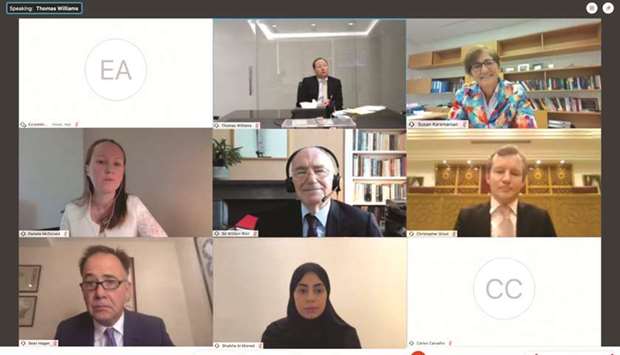The impact of Covid-19 on commercial contracts and sovereign borrowing was the subject of a webinar organised by the College of Law (CL) at Hamad Bin Khalifa University (HBKU) and the Qatar International Court and Dispute Resolution Centre (QICDRC). The event featured a distinguished panel of experts with vast experience in Qatar and foreign legal systems.
Lockdowns and other measures designed to tackle Covid-19 have undoubtedly affected commercial contracts and sovereign borrowing. The panellists reminded participants that Covid-19 has severely disrupted global supply chains, made commodity prices volatile, and exposed businesses to cash flow problems and in some cases bankruptcy. The need to address contractual issues such as force majeure, impossibility of performance and business interruption has arisen, and it will likely increase in the months ahead, as with concerns around public debt. In a bid to stave off “a coronavirus depression”, governments and international organisations might consider co-ordinated action yet their ability to do so in short order is limited.
Key insights from the Qatar Financial Centre (QFC) Regulatory Tribunal were delivered by its chair, Sir William Blair, and Justice Sean Hagan, who previously served as General Counsel to the International Monetary Fund. Christopher Grout, QICDRC Registrar, joined them. Private sector contributors included Pamela McDonald, senior associate with Pinsent Masons, and Thomas Williams, a partner at Sultan Al-Abdulla & Partners. HBKU Law dean Susan L Karamanian moderated the session with HBKU Law third-year juris doctor (JD) student Shaikha al-Misned overseeing the Q&A session.
Speaking after the webinar, Sir William noted that “This event co-hosted by HBKU’s College of Law and the QICDRC brought together experts on commercial and construction contracts and sovereign borrowing and provided valuable insights into the massive impact that the Covid-19 pandemic is having on contractual performance both in individual countries and worldwide.”
Dean Karamanian further remarked: “As countries around the world ease lockdown measures, the full economic impact of this virus will become increasingly apparent. This webinar provided expert insight into what has happened, what to expect, and how legal systems will respond to the coming challenges. Further, it reminded everyone about the tremendous human consequences of the pandemic.”
Her last point was emphasised by Grout, who observed that “One of the most important considerations in times of crises is maintaining access to justice and ensuring that people do not become marginalised from the justice system. As was explored during the webinar, the volume of disputes is very likely to rise. People, especially the most vulnerable, need to have access to lawyers, and court systems need to be able to cope with the influx of cases.”
On September 23, the college will host Swiss-based Jur AG for the webinar Dispute Resolution on Blockchain. Jur AG Team members will lead a presentation on smart legal contracts, Blockchain and online dispute resolution platforms. They will also put theory into practice with a use case scenario involving their Open Justice Platform, the world’s first multi-jurisdiction online dispute resolution platform. Speakers will share their experiences of starting up a company in the challenging and engaging legal tech industry.
On September 30, Taxation of Multinational Enterprises in the Post-BEPS Era: Potential Challenges of Implementing Qatar’s Transfer Pricing Rules brings together key stakeholders to analyse new Executive Regulations pursuant to the Income Tax Law No. (24) of 2018. Introduced in December 2019, the new regulations reinforce the adoption of the arm’s length principle in the taxation of related entities when they transact with each other. The colloquium will also consider ongoing Base Erosion and Profit Shifting (BEPS) reforms and how these will apply to the taxation of multinational enterprises in the foreseeable future.
The College of Law regularly holds events that showcase its research interests and activities. More information is available on cl.hbku.edu.qa

The webinar in session
